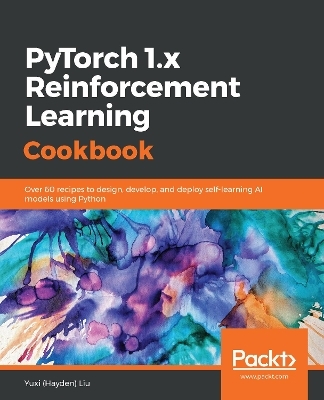
PyTorch 1.x Reinforcement Learning Cookbook
Packt Publishing Limited (Verlag)
978-1-83855-196-4 (ISBN)
Implement reinforcement learning techniques and algorithms with the help of real-world examples and recipes
Key Features
Use PyTorch 1.x to design and build self-learning artificial intelligence (AI) models
Implement RL algorithms to solve control and optimization challenges faced by data scientists today
Apply modern RL libraries to simulate a controlled environment for your projects
Book DescriptionReinforcement learning (RL) is a branch of machine learning that has gained popularity in recent times. It allows you to train AI models that learn from their own actions and optimize their behavior. PyTorch has also emerged as the preferred tool for training RL models because of its efficiency and ease of use.
With this book, you'll explore the important RL concepts and the implementation of algorithms in PyTorch 1.x. The recipes in the book, along with real-world examples, will help you master various RL techniques, such as dynamic programming, Monte Carlo simulations, temporal difference, and Q-learning. You'll also gain insights into industry-specific applications of these techniques. Later chapters will guide you through solving problems such as the multi-armed bandit problem and the cartpole problem using the multi-armed bandit algorithm and function approximation. You'll also learn how to use Deep Q-Networks to complete Atari games, along with how to effectively implement policy gradients. Finally, you'll discover how RL techniques are applied to Blackjack, Gridworld environments, internet advertising, and the Flappy Bird game.
By the end of this book, you'll have developed the skills you need to implement popular RL algorithms and use RL techniques to solve real-world problems.
What you will learn
Use Q-learning and the state–action–reward–state–action (SARSA) algorithm to solve various Gridworld problems
Develop a multi-armed bandit algorithm to optimize display advertising
Scale up learning and control processes using Deep Q-Networks
Simulate Markov Decision Processes, OpenAI Gym environments, and other common control problems
Select and build RL models, evaluate their performance, and optimize and deploy them
Use policy gradient methods to solve continuous RL problems
Who this book is forMachine learning engineers, data scientists and AI researchers looking for quick solutions to different reinforcement learning problems will find this book useful. Although prior knowledge of machine learning concepts is required, experience with PyTorch will be useful but not necessary.
Yuxi (Hayden) Liu is an experienced data scientist who's focused on developing machine learning and deep learning models and systems. He has worked in a variety of data-driven domains and has applied his expertise in reinforcement learning to computational. He is an education enthusiast and the author of a series of ML books. His first book, Python Machine Learning By Example, was a #1 bestseller on Amazon India in 2017 and 2018. His other books include R Deep Learning Projects and Hands-On Deep Learning Architectures with Python published by Packt. He also published five first-authored IEEE transaction and conference papers during his master's research at the University of Toronto.
Table of Contents
Getting started with reinforcement learning and PyTorch
Markov Decision Process and Dynamic Programming
Monte Carlo Methods for making numerical estimations
Temporal Difference and Q-Learning
Solving Multi Armed Bandit problems
Scaling up Learning with Function Approximation
Deep Q-Networks in Action
Implementing Policy Gradients and Policy Optimization
Capstone Project: Playing Flappy Bird with DQN
| Erscheinungsdatum | 06.11.2019 |
|---|---|
| Verlagsort | Birmingham |
| Sprache | englisch |
| Maße | 75 x 93 mm |
| Themenwelt | Mathematik / Informatik ► Informatik ► Programmiersprachen / -werkzeuge |
| Informatik ► Theorie / Studium ► Künstliche Intelligenz / Robotik | |
| ISBN-10 | 1-83855-196-4 / 1838551964 |
| ISBN-13 | 978-1-83855-196-4 / 9781838551964 |
| Zustand | Neuware |
| Haben Sie eine Frage zum Produkt? |
aus dem Bereich


